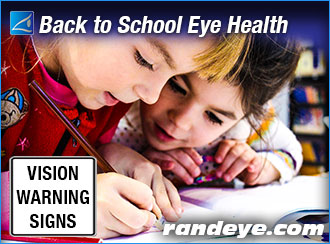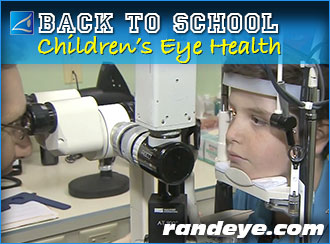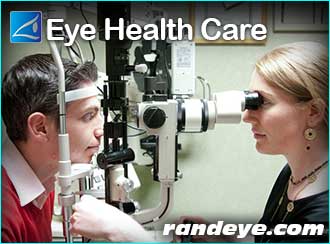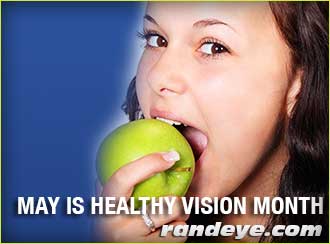Back to School Eye Health – Vision Warning Signs
Summer’s not over just yet, but back to school is just around the corner.
These are formative years for your child, personally and physically. If you have noticed a change in your child’s behavior it may be due to a change in his or her vision.
Below is a list of warning signs. If your child demonstrates any of these symptoms, it is advisable to consult your eye care professional.

- Child holds reading material too close to face-fourteen to sixteen inches is recommended.
- Child sits too close to TV-eight to ten feet is recommended.
- Complains that writing on classroom blackboard is blurry or too small.
- Missing the ball very often in sports may indicate a problem with vision.
- Child rubs his or her eyes or complains of itching or burning. This could indicate a conjunctival or eyelid problem.
- Child complains of double vision.
- Child points to words while reading.
- Writing words or letters backwards could indicate a problem.
- Child complains of headaches.
- Child skips or misses words while reading.
- Child sees better out of one eye than the other.
- Child complains of pain in or around the eye.
- Poor hand-to-eye coordination.
- Photophobia (bright lights bother eyes).
- Dizziness or nausea.
- Poor concentration while reading.
- Abnormal head tilt while reading.
- Closes or covers one eye to read.
Four out of five children do not receive vision screenings. A screening rarely takes more than an hour and presents no discomfort, but the comfort in knowing that you’ve made your child’s vision a priority, is something YOU should get extra credit for. Call or click today for an appointment because the first school bell is about to ring!
Back to School Eye Health
While you’re busy with enrollment forms, back-to-school shopping, schedules and immunizations for your child, August is busy being Children’s Eye Health and Safety Month, making it a good time to remind you to get your child’s eyes checked before that first school bell rings.

Most children have healthy eyes, but one in four, or 25% of school-aged children either have vision problems or suffer from some degree of visual impairment. What’s more concerning is that The American Academy of Ophthalmology estimates that 80% of preschoolers don’t receive a needed vision screening.
Because they’re young, your children may not have much history with their vision, so what they may perceive as “normal” vision might be something that needs to be addressed, and an eye exam is the best way to find out.
Before you know it, there’ll be homework, school projects, group activities, after-school club meetings and team sports to get them to and from.
So don’t wait for the first bell to ring, have your children’s vision checked now, so they can start the school year off with a clear slate and clear vision.
Senior Independence Month
We’ve SEEN your Independence, and we like what we see!
Rand Eye Institute celebrates Senior Independence Month. We salute our seniors who have the Vision to live in the new millennium in a positive and upbeat manner. As we get older, we realize that we need the help of friends and family in our day-to-day lives. Maybe we can no longer safely commute in rush hour traffic, carry groceries up three flights of stairs, or even see things as clearly as we used to. The truth is, no one wants to feel helpless and dependent upon others for everything, and while sooner or later we’ll have to surrender some of those tasks, there are still ways to feel independent and useful in your own life. Here are some of the ways when it comes to vision:

Take a Drive on Independence Road
We all enjoy a Sunday ride or a scenic road trip, navigating towards making new memories along the way and vision plays an important role in achieving this. If you love dinners out with friends or night-time entertainment, having restrictions on your driving will surely place a limitation on your fun. When you start to experience difficulty driving at night and seeing increased glare and halos from oncoming headlights, it’s time to visit your ophthalmologist. You may be experiencing the signs of cataracts, but great news, with the latest advancements in laser cataract surgery you may regain your independence and get behind the wheel in no time. So jump back in the driver seat, take control of your vision and buckle up-the road ahead awaits you!
Stay Connected and Up to Date
Do you remember the days when you had to get up from the couch to change the channel? Well, just like remote controls, technology is your friend and helps you stay in touch with friends and family. To be a most effective digital communicator you need clear vision, not just at a distance, but up close and clear intermediate vision helps you see your laptop or smartphone in focus. A small laptop with a wireless connection is all you need. You can download free video-chat programs so you can “connect” with your kids and grandkids, or one of the most popular “face-to-face” apps available on mobile phones. Your local technology stores even offer free group classes to teach you how to do it all. E-mail and texting are great ways to send and receive photos of the kids too. Connectivity promotes vitality and makes you feel good that you’re in touch with today, and with the exception of the purchasing a computer or mobile device, it’s virtually free. Many restaurants, coffee shops and malls offer free wireless “wi-fi” connections, while libraries have computers for use at no charge. So log on and live life with new connections!
Healthy Eating Can Equal Healthy Vision
Being independent means that YOU choose what you eat. And while your menu may be all your own, making informed food choices can help to improve your eye health. Here are five foods your eyes wish you would include in your diet:
- Carrots, rich in beta-carotene. You SAW that coming!
- Leafy-greens, which are packed with lutein and, lower the risk of macular degeneration and cataracts.
- Eggs. The yolk is also a prime source of lutein and Zeaxanthin as well as zinc, which helps reduce the risk of macular degeneration.
- Citrus and berries, which are packed with vitamin C. Can you say “smoothie”?
- Almonds are filled with vitamin E and one ounce daily just about gets it done.
- Fish, like tuna, salmon, mackerel, trout and even anchovies add the fatty acid, DHA, which is good for your eyes, see?
And Finally, your Independent Opinions Are All Your Own
We all have our own voice. While not everyone will agree with you and your opinions, you should still believe in yourself, after all, you come with a lifetime of experiences and no one can dispute that. You can offer your opinions without being confrontational. So say what you believe, believe what you say and believe in yourself, because you’re awesome!
So starting today: Get connected, take care of yourself, let others contribute to your well-being, express your opinions on the move and make healthy choices at the dinner table, and, before long, you’ll find that you’re much happier in your senior life.
Eye Health Care
Eyesight has the largest impact on our day-to-day life. Vision is the ONE sense that people fear losing the most. Pay attention to your eye health so that you can spot problem areas in your vision sooner.
Healthy Vision Month is a great time to learn more about eye health- care and an opportunity for you to gain a better understanding of how at-risk you may be for potential vision problems.
How do you know if YOU are at risk?
Many common eye diseases that can lead to vision loss or blindness, such as diabetic eye disease, glaucoma, or age-related macular degeneration (AMD), often have no early warning signs or symptoms. Scheduling regular eye exams to make sure your eyes are healthy and seeing their best is most important. However, the risk of vision loss and blindness is higher for some based on race, ethnicity, and other demographic and socioeconomic factors.

SEE if it’s you
You might be at higher risk for vision loss if you have a family history of eye disease; have diabetes; are African American, Hispanic/Latino, American Indian, or Alaska Native; or are older than age 50.
- Glaucoma affects your side or peripheral vision first. Turns out it’s three times more common in African Americans than in Caucasians, in fact, in African Americans it is a leading cause of blindness.
- Diabetic retinopathy can lead to blindness caused by uncontrolled diabetes. Studies show that it occurs more often in Hispanics/Latinos than in Caucasians.
- American Indians and Alaska Natives are 35 % more likely to get diabetes than the average adult in the U.S, putting them at increased risk of diabetic eye disease.
- Older adults are at higher risk of developing age-related eye diseases and conditions such as AMD, glaucoma, or cataracts. AMD is a leading cause of blindness in Caucasians.
What does all this mean? It means that now more than ever, you should look to The Rand Eye Institute for all of your vision needs. Schedule your yearly comprehensive eye exam today to maintain healthy eyes all year long.
Keeping Your Eyes Healthy
Living an overall healthy life is good for your eyes. You can start taking steps toward living a healthy life by:
Maintaining a healthy weight: Being overweight or obese can increase your risk of developing diabetes and other systemic conditions, which can lead to vision loss, such as diabetic eye disease or glaucoma.

Eating healthy foods: Eating a diet rich in fruits and vegetables, particularly dark leafy greens such as spinach, kale, or collard greens, is important for keeping your eyes healthy. Research has also shown there are eye health benefits from eating fish high in omega-3 fatty acids, such as salmon, tuna, and halibut.
Not smoking: Smoking is as bad for your eyes as it is for the rest of your body. Research has linked smoking to an increased risk of developing age-related macular degeneration, cataracts, and optic nerve damage, all of which can lead to blindness.
Managing chronic conditions: Many conditions, such as diabetes, hypertension, and multiple sclerosis, can greatly impact vision, resulting in inflammation of the optic nerve, diabetic retinopathy, glaucoma, and even blindness. Managing these conditions with the help of your health care provider can often prevent these eye problems from occurring.
Healthy Vision Month
When it comes to our health, we often visit our doctor or nurse regularly to ensure that our bodies are healthy, but what about our eyes? Our eyes are just as important.
During Healthy Vision Month, it is important to be educated about the proper ways to protect your vision.

One of the ways to keep your vision young and working it’s A-Game, is to schedule regular eye checkups and yearly comprehensive eye exams.
While you might think your vision is good enough and that your eyes are healthy, visiting The Rand Eye Institute for a comprehensive dilated eye exam is the only way to be completely certain.
When it comes to common vision problems, many people don’t realize their vision could be improved with glasses or contacts. In addition, many common eye diseases such as glaucoma, diabetic eye disease, and age-related macular degeneration often have no symptoms, so a dilated eye exam is the only way to detect these diseases in their early stages.
During a comprehensive dilated eye exam, drops are placed in your eyes to dilate, or widen, the pupil. At Rand Eye Institute we use a special magnifying lens to examine your retina and look for signs of damage and other eye issues. After the examination, your close-up vision may be blurred for several hours, so it’s recommended that you have someone with you to drive you home.
An annual exam could end up being a life saving event.
